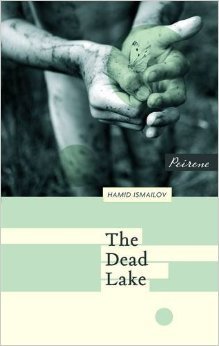 How do you tell the story of a remote injustice to a jaded world?
How do you tell the story of a remote injustice to a jaded world?
You could make a documentary, or interview the survivors and write a 15,000-word magazine exposé. You could petition the authorities to commission an official enquiry, and wait a decade or two for the results. Hamid Ismailov chose to write a lyrical literary fairytale about a boy who swam in a forbidden lake and never grew up.
The injustice in question is the detonation of 468 nuclear bombs in four decades of testing at the Semipalatinsk Nuclear Test Site in Soviet Kazakhstan, unleashing a total of 2,500 times the force of the Hiroshima bomb on the local population.
If I tell you the bare bones of the story, it’ll sound melodramatic. A young, preternaturally gifted musician is exposed to radiation, killing not only his dreams of the conservatoire but also his planned future with his childhood sweetheart, and ends up as a yoghurt vendor on the trains across the steppes.
But Ismailov doesn’t tell it that way at all. The musician, Yerzhan, is a young boy at a remote way station in the Kazakh steppes, and although his story is told in the third person, we see the world through a young boy’s eyes. He hears talk about “the Zone” nearby, but doesn’t know what it is. He pictures it as a droning fly buzzing around him, and periodically it makes the whole world shake. Here he is on a train with his grandfather:
Suddenly the shadows in the wagon shifted abruptly, as if pushed aside by the huge hairy legs of the fly on Yerzhan’s nose. A din louder than its buzzing, worse than the rumble of the wagon and the empty metal bread boxes followed, penetrating the eardrums of the men and the boy. The wagon began to dance. The old men disappeared through the open door. The fly made the ground under Yerzhan’s feet spin. Then it dragged him into a rumbling darkness.
They’re taken back home by some men, who give them bread and potatoes as compensation, and Yerzhan never does get to the town of Semey to learn from the master bards. His urine “turned red, as if from shame.”
All of the encounters with the nuclear testing zone are told in this magical way, starting with Yerzhan’s conception, which takes place when his mother chases after a silk scarf caught on the wind. Suddenly the sinking sun soars back into the sky, a roaring wind springs up out of nowhere, and then she sees a creature looking like an alien in a spacesuit standing over her.
The pivotal moment is when he swims in the forbidden lake – a beautiful stretch of perfectly still, bright green water. It’s a childish prank to impress his sweetheart Aisulu, but from that moment on, Yerzhan never grows. By the time we see him selling yoghurt on the train, he’s 27 years old, but looks like a 10-year-old boy.
The concept of the boy who stops growing is reminiscent of Günter Grass’s The Tin Drum. But whereas Oskar Matzerath chose to stop growing, Yerzhan has that condition imposed on him. He desperately fights against it, trying everything from pull-ups on the door frame and stretching in bed to lying out in the sun all day. He hears that basketball players are tall, so nails a rusty wheel hoop to the wall of the house and spends hours tossing a ball of camel wool through it. His family give him carrots, fish oil, lamb’s livers and an exorcism. But nothing works.
It’s a sad story, but Ismailov doesn’t try to pluck at our heart-strings or hammer home the allegories. He just tells us the story, in sparsely beautiful prose, bringing the world of the remote Kazakh steppe alive in a bizarre, fantastical and yet strangely believable way.
For more reviews, check out Shlur, Neil Rathmell, Curb, BookHugger, SkyLightRain or A Novel Approach.




There are 15 comments
This sounds very good. Not exactly breezy but very good. Thanks for the review. I wasn’t aware of it. I was equally not aware of these testings. In’s an interesting question – how to write about something like this.
Hi Caroline,
I forgot to mention that it’s short – novella-length. But yes, I still wouldn’t call it breezy! Not too heavy either, though. I’d be interested to know how the story evolved – whether the writer thought “Here’s an issue I want to write about” or whether it evolved as he was telling the story. Certainly we hear so many horrific stories in the news that it’s hard to know how to tell them. This was very fresh, I felt.
Wow, this sounds good. I have never thought about where the Soviets did all their testing before. I very much enjoyed your review.
Glad you liked it, Stefanie. Yes, I think you’d enjoy the book. I never thought about it either – I imagined a remote area, because the country’s so vast. But even remote areas have people in them.
This sounds powerful and a it sounds like and innovative but disturbing way to convey this message.
I knew that there were some very bad results for people living near various nuclear weapons test centers around the world. I had no idea that 468 bombs were ever detonated in one place.
Hi Brian
Yes, I’d heard about the French nuclear tests in Polynesia, but not these ones. I found it a very innovative way to tell the story. Fiction can really make you feel as if you’re there, which can be much more powerful than just getting the facts.
A very interesting premise for this novella. The excerpt feels so mystical to me. As a writer I can’t pull that off and I admire writers who can do so in a way that draws readers in without being forced or nonsensical. Thank you for introducing me to this author and story.
It was very mystical, Jackie – the whole novella read like that. It felt like a fairytale, but a very serious, adult fairytale. There were fantastical elements, but they certainly never felt forced or nonsensical. You’re right, it’s a tough thing to pull off! I struggle with it too, and admire writers like Ismailov who do it so well.
Wonderful review, Andrew! This book looks very interesting. I didn’t know that 468 nuclear detonations were done in one area. I can’t imagine the kind of devastation that would have caused to the land and to the people. The author’s way of telling the story is definitely innovative. I liked that passage that you have quoted. I am liking Peirene press more and more every day 🙂
Hi Vishy
Yes, it is a very interesting book – a fresh, different kind of story, told in an innovative way. And that part of the world is certainly not one that appears very often in English-language fiction. I like Peirene too! They’ve carved out a real niche and produce really high-quality books. They’re also physically well designed and put together too, which is refreshing 🙂
I wasn’t aware of these nuclear tests but well, it makes sense, they had to do them somewhere.
This way of picturing the explosions and the zone remind me of how Boris Vian chose to describe cancer in The Foam of the Days.
I didn’t know about that book, but it sounds interesting – thanks for mentioning it. Had never heard of Boris Vian to be honest, although based on some quick web research he seems quite well-known and influential. One for me to check out.
I think Vishy reviewed Foam of the Day.
Ah, thanks for that. Yes, he did – just read his review, and I think I’ll like this one. Seems it’s called Foam of the Daze in English, which seems a strange sort of pun to use in a title.
You’re right, the title is Foam of the Daze. In French it’s L’écume des jours. It’s a wonderful novel.